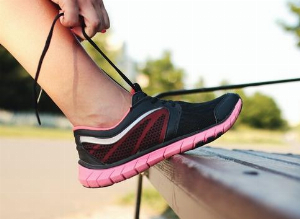5 tips for successfully getting back into exercise (even with a chronic illness)!
Published Sep 10, 2020 • By Candice Salomé
With summer vacation over and your head full of happy memories, it's high time to get back into exercise. But why? The start of the school year, like the New Year, is a great time to make resolutions. There are many reasons for making such decisions: to eliminate the overindulgences of summer vacation, to fight against the stress of the new school year, to maintain one's health and to do oneself some good...
Exercise is also a fabulous ally in the case of many chronic illnesses.
For example, studies have clearly demonstrated that physical activity can help reduce the risk of cardiovascular disease (35% reduction in cardiovascular mortality) and reduces the risk of developing high blood pressure by an average of 15%. Exercise is also key in the treatment of mild to moderate depression.
Many people have not been physically active for some time. It is therefore important to get back into exercise carefully so as not to injure oneself, and we will give you the keys to do so safely.
Read our guide!

Everyone knows that exercise is good for your health in every way: it keeps you fit and in shape, it reduces stress and anxiety, it helps you set goals and it makes you proud when you reach them. Yet it is not always easy to get back into it after a long period of inactivity.
Moreover, in its collective assessment “Physical Activity - Prevention and Treatment of Chronic Diseases” published in February 2019, INSERM (French National Institute for Health and Medical Research) emphasizes that physical activity as a non-drug treatment is a therapy that has been approved by the French High Authority for Health since 2015.
Depending on the chronic illness, athletic activity can be prescribed as soon as the diagnosis is made and can reduce the risk of co-morbidity, the risk of overall mortality and mortality linked to the illness.
According to Dr. Béatrice Fervers, oncologist, exercise can reduce fatigue by up to 40%, which is far greater than any other drug treatment. She adds "in breast cancer, for example, it has a favorable effect on improving the chances of survival and reducing the risk of recurrence".
But lack of time, motivation, physical condition and so on can be a barrier to a successful return to physical activity. It is important to know to go slowly, to practice progressively and according to your own physical abilities.
Let us give you the keys to a successful return to exercise!
1. Choose a sport or activity that is appropriate for you and that you enjoy:
In order not to see exercise as a constraint, it is important to choose a physical activity that you like and that you enjoy. For example, if you like nature, why not go hiking? You won't even feel like you're working out!
The second important point is to consider a sport that is suited to your abilities, your health condition and your illness.
According to François Carré, professor of physiology at Rennes University Hospital: "It's not a question of sport but of physical activity adapted and individualized to the patient. It should be based on endurance and muscular strengthening. Whenever we move, it counts as exercise. There is no one sport that is better than another".
The doctor may prescribe a minimum of 3 sessions per week, according to the patient's profile and condition.
If you like team sports, why not choose to play volleyball, soccer or basketball?
If you prefer to practice your activity on your own, you can turn to running, brisk walking, swimming or climbing.
Finally, why not try an indoor sport such as cross-training, weight training or fitness.
The main thing is, of course, to find what makes you happy, so don't hesitate to test and try different activities to find your own!
2. Set achievable goals:
Whatever your goal for getting back into shape (weight loss, improving physical abilities, building up muscle, challenging yourself, etc.), the most important thing is to set yourself achievable goals in increments so that you don't injure yourself or lose motivation.
For example, if you haven't run in 5 years, don't start by setting a goal of running 10 miles right away. You should do it gradually.
So, start by running for 20 minutes at your own pace. When those 20 minutes become "easy", go for a 30-minute run, and so on.
By progressing gradually, you will stay motivated, avoid injuries, and you will be able to practice for the long term.
Don't forget that for any physical activity, medical approval is recommended. So talk to your doctor before you start exercising again and ask him or her for advice on the frequency and intensity of your sessions.
3. Set a schedule and stick to it:
To ensure that your return to exercise takes place in the best possible conditions, it is important to be organized. Your motivation may be lacking at times and it can be easy to find excuses to justify it (lack of time, for example). You must therefore set yourself well-defined time frames and stick to them!
Moreover, regular training will allow you to achieve optimal physical fitness. It is recommended to start with 1 session of physical activity per week and gradually increase to 3 sessions per week.
As for the intensity of each session, experts recommend that you be able to talk during the activity (a sign that you are not over-exerting yourself). The intensity, as well as the frequency, can increase as the sessions progress. Make sure to listen to your body.
4. Stay motivated in the long term:
It can be difficult to stay motivated throughout the year for a number of reasons. If you practice an outdoor sport (running, cycling, hiking, etc.), it can be difficult to stay motivated in winter, for example. But if you stop for a few months, you will have a hard time getting back into it when the sun comes out and will have lost your physical abilities.
To stay motivated, you can, for example, workout with a partner! With a friend, a coworker or your spouse! When one of you loses motivation, the other will be there for support!
Listening to music can also help motivate you during exercise. Lively music will keep you focused and push you to challenge yourself!
Finally, take your measurements and weigh yourself before you start trying to get back in shape. This will give you an objective assessment of your progress. What better way to stay motivated?
5. Apps, gyms, coaches... get back into sport easily:
Apps dedicated to sport:
Do you want to gradually get back into shape and need some guidance on how to do it? There are many applications that allow you to exercise with a "coach" and often from your living room. Here are a few applications that will allow you to get back into shape easily:
- Decathlon Coach - Sport, Running & Fitness: free sports programs to do from the comfort of your own home. App Store or Android.
- Seven - 7 Minute Workout: personalized workouts based on scientific studies to provide maximum benefit in the shortest time possible. App Store or Android.
- Nike Training Club: hundreds of programs certified by professional coaches. App Store or Android.
Gyms:
To get back in the saddle, it can be a good idea to surround yourself with professionals who can create a training program suited to your abilities and objectives. You can also find group lessons (Zumba, kickboxing, aquafitness, boot camp, etc.). The advantage of these classes is that it is possible to meet people and get motivated in a group.
Outdoor activities:
Outdoor activities (walking, swimming, running, etc.) have many benefits for the body and mind.
These activities allow for better oxygen levels, a connection with nature, but also to take in the sun and enjoy its benefits (especially vitamin D).
Moreover, these activities often require little investment.
Motivate yourself with Carenity members:
Carenity members are sharing on this topic, you can join them and motivate one another by clicking here: Challenge: Let's get back into shape together after the COVID-19 lockdown!
By following these few guidelines, you'll have all the odds in your favor for a successful return to physical activity! You'll soon be feeling proud of yourself and discover the countless benefits that sport brings to your daily life!
Was this article helpful to you?
Share your thoughts and questions with the community!
Take care!
Sources :
https://www.mangerbouger.fr/Le-Mag/Bien-etre/A-la-rentree-je-me-remets-au-sport
https://www.sport-passion.fr/conseils/motivation-objectifs-SMART.php
https://conseilsport.decathlon.fr/conseils/se-mettre-au-sport-comment-commencer-tp_11689#:~:text=Pour%20l'instant%20plusieurs%20obstacles,laissez%20votre%20corps%20s'habituer
https://www.huffingtonpost.fr/yann-couderc/se-remettre-en-forme-pour-la-rentree_b_7997728.html
https://www.fedecardio.org/Je-m-informe/Je-bouge/sport-et-maladies-chroniques-des-benefices
https://www.inserm.fr/information-en-sante/expertises-collectives/activite-physique-prevention-et-traitement-maladies-chroniques
https://www.europe1.fr/technologies/trois-applications-pour-se-remettre-au-sport-en-douceur-3882239#:~:text=Partagez%20sur%20%3A,groupe%20peuvent%20aussi%20essayer%20OuiRun.
https://www.assurance-prevention.fr/sport-adapte-maladie-cardiovasculaire.html#:~:text=Chez%20les%20personnes%20qui%20souffrent,mortalit%C3%A9%20toute%20cause%20de%2033%20%25.
https://www.revmed.ch/RMS/2015/RMS-N-481/Activite-physique-sport-et-hypertension-arterielle
Comments
You will also like

What are the dangers associated with the over-the-counter sale of certain medicines?
Dec 19, 2020 • 6 comments

 Facebook
Facebook Twitter
Twitter

